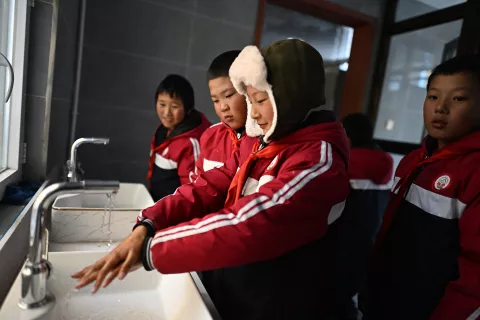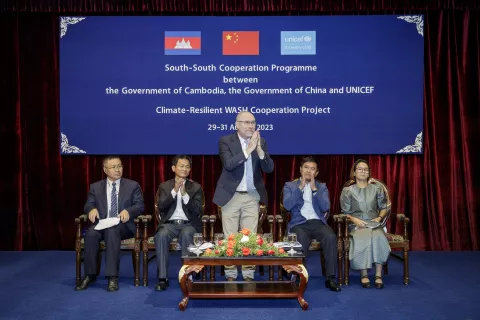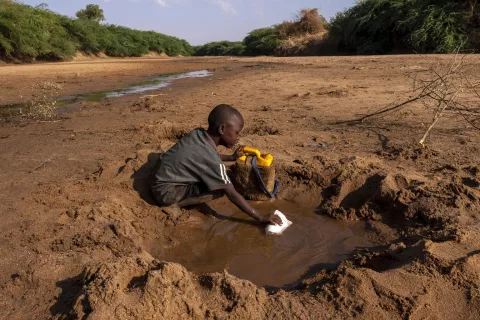UNICEF Provides Children in Caochuan Village with Clean Water
UNICEF Provides Children in Caochuan Village with Clean Water
XIHE COUNTY, GANSU, 3 MARCH 2009 – Last May's massive earthquake damaged or destroyed water supply systems throughout the earthquake zone. But in rural areas like Caochuan Village in Gansu, no damage was caused to a community water supply system: there didn't have one yet.
In the aftermath of the devastating earthquake, UNICEF has been working throughout the affected provinces of Sichuan, Gansu, and Shaanxi to restore access to clean water to earthquake survivors. But as part of its strategy of "Building Back Better," UNICEF is also working in remote, rural areas like Caochuan Village to construct water systems for those children and their families who did not have access to clean water, even before the earthquake.
Construction on the UNICEF-supported community water supply system in Caochuan Village began in September 2008. For the past few months, the new water system has been providing children in the village with clean water. "Before, we had to use an old well, even though the water from it wasn't safe. Now that we have a clean water supply system, we don't use that well anymore," said 10-year-old Wang Wenjuan, a fourth-grade student at Caochuan Primary School. These days, Wang Wenjuan and her classmates can drink directly from the temporary tapstand set up at their school and connected to the water supply system. Meanwhile, construction of a permanent school water tapstand is underway and will be complete in a few months' time.
On a recent field visit to Xihe County, UNICEF Emergency Specialist Liu Pengxin inspected the water supply system with counterparts from the Xihe County Water and Electricity Bureau. The technicians and engineers monitored the pumping mechanism that brings untreated water from a source just outside the village, to a filtration system and storage tank located some 500 meters higher in the mountains. Gravity-fed pipes bring clean water from the mountain-top storage tank to the 250 students of Caochuan Primary School and the 1,600 residents of Caochuan Village.
"It was very difficult to construct this water supply system, especially the filtration system and the water tank. All of the sand, gravel, and cement had to be manually brought to the top of the mountain. But the villagers were happy to provide the labour, because they knew that it meant clean water for their children," recalled Liu.
Thanks to the efforts of the villagers, clean water is available to the children of Caochuan Village, both at school and at home. With UNICEF support, taps connected to the clean water supply system have been installed in each of the 270 households in the village. Unlike in the past, when villagers had to walk – in some cases, for several kilometres – to fetch water of even substandard quality, all they have to do now to enjoy clean water is turn on the tap. Each village household pays just 2-3 RMB per month for the water.
In addition to its support of the community water system, UNICEF is constructing sanitary latrines and handwashing stands at Caochuan Primary School so that children can study and play in a hygienic environment. Caochuan Village is just one of the 39 rural communities in Gansu's Xihe County that UNICEF is reaching, with the support of IKEA Social Initiative, with its complete package of water and sanitation interventions in the aftermath of last May's devastating earthquake.




